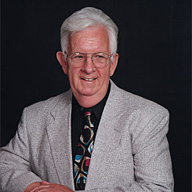 |
|
| Vol. 13 No. 12 December 2011 | Page 11 |
Dean Kelly
 We were keeping Lil T (Thomas our 4-year-old grandson). I had put some straws we bought in a drawer at home, and suddenly we could not find them (they had dropped out of the drawer into the cabinet below we found out). We were discussing what could have happened to them, and Lil T said, “Probably the Devil took them. He doesn’t like us!” I said, “Well we do not like him either.” Lil T said, “No, we only like God!”
We were keeping Lil T (Thomas our 4-year-old grandson). I had put some straws we bought in a drawer at home, and suddenly we could not find them (they had dropped out of the drawer into the cabinet below we found out). We were discussing what could have happened to them, and Lil T said, “Probably the Devil took them. He doesn’t like us!” I said, “Well we do not like him either.” Lil T said, “No, we only like God!”
As I reflected on what Thomas said, I could not help but realize that this little fellow understood a concept that most people do not: Satan does not like us; Satan does not want what is best for us; Satan does not care at all. He is truly “out to get us” in any way he can possibly trap us.
It amazes me that so many have it turned around. They look at God, and say, “Well He tells me I cannot do this and that, or live this lifestyle, etc. Therefore, God does not really care for me.” It is true that Satan says, “Do whatever feels good to you, it really does not matter what you do, you will be fine doing it” (remember – “Thou shalt not surely die!”). God, on the other hand, does warn us about what is harmful, and He does guide us away from what is sinful. God truly cares for us. When the Bible says that “God so loved the world that He gave His only begotten Son,” it is telling us that God cares. God is “not willing that any should perish, but that all should come to repentance.”
I listen to my daughter and son-in-law dealing with their children. I know beyond a doubt how much they love them, and those children know it, too. However, as I listen, I realize how much they have to say “no,” “don’t,” “stop that,” etc. Why do they say those things? Because if their children are unregulated, they know that would be the biggest sign of being unloved. Most of the time “no” and “don’t” represent those parents’ desire to keep those babies from harming themselves. The “first commandment with promise” was to children to obey their parents. The promise was the opportunity for a longer life. When children fail to obey their parents, then they become involved in behaviors that will tend to shorten their lives. God, as our Heavenly Father, regulates for our good, not for His own. His laws, rules, etc. are exclusively designed to protect us from the consequences of sin, both in this life and in eternity.
Satan wants us to be involved in self-destructive behavior. He delights in our suffering and pain. He tells us, “You have the right to do…” or “You were born into this…” or “No one has the right to tell you that you cannot…” He tells us that if it makes us feel good, then it is right, and encourages us to act in ways that are not only self-destructive but that will destroy other people as well.
There is no Bible verse that reads this way, but it can accurately be said, “Satan so hates the world, that he tried to destroy the Son sent by the Father. His hope is that all will perish, that none will be saved.” Satan will dedicate his full efforts to destroying us, and he is a very capable and masterful manipulator of the world around us, of people we know and friends we have, who will work gladly, or sometimes unwittingly, to help him destroy us, here on earth and in eternity.
Yes, Lil T, Satan does not like us, and his hatred for us grows even stronger when we turn to God. Peter calls him a “roaring lion, seeking whom he may devour.” He will call to us, “I will give you freedom,” but he only enslaves. He tells us, “I will make you happy,” when all he wants is for us to be in total misery. He says, “I will show you the way to life,” but he only leads to death! That, Thomas, is why we “only like God,” because He cares for us.![]()
Royce Pendergrass

Albert Einstein was what we call a “genius.” He had the ability to study and comprehend how things worked and the results that would occur when certain things were altered or challenged. The Einstein equation expresses the relation of mass and energy and the Einstein theory is that there is no absolute motion but that all motion is relative. Does that sound profound? It does to me! He was a deep thinker but he did not let that get in the way of his understanding that his intelligence was not of himself. He knew that there was an outside force. He made this famous quote: “Look deep into nature and then you will understand everything better.” He also said, “We still do not know one thousandth of one percent of what nature has revealed to us.” Not a great deal is known about Einstein’s religion, and it is true that these declarations from him about nature are not full admissions of him believing in “a greater power,” but at least he realized he could become more intelligent by observing and learning from God’s creation.
Is it not notable to know that sometimes even “great” minds do not rule God out? Too often, people who make a scientific “break-through” of some sort want all the accolades that go with the discovery. They believe they are the brains and are so smart that they do not need to depend on someone else for anything.
The Wise Man said, “don’t be wise in your own eyes; fear the Lord and depart from evil” (Proverbs 3:7). It sounds as if trusting in one’s own “smarts” will lead right into evil. This chapter in Proverbs is full of God’s wisdom. We read in Verse 6, “The Lord gives wisdom; out of His mouth comes knowledge and understanding.” A person may think he is really smart, but that all fades in comparison to the Creator’s knowledge and wisdom. No one can depend on himself to provide things eternal, but the results of how each one lives will determine his eternity as to whether he will dwell eternally in heaven or hell. Both places are real.
Of course, there are those who are so “smart” that they will tell you they do not believe in heaven or hell. However, their declaration of not believing will pass, for we read in Romans 14:11, “As I live, says the Lord, every knee shall bow to Me and every tongue shall confess God. Every one of us shall give account of himself to God.” Paul continued this thought in 2 Corinthians 5:10, “We must all appear before the judgment seat of Christ that everyone may receive the things done in his body, according to what he has done, whether it is good or bad.” There has never been a person who has lived on the earth who will avoid the great reckoning day of the judgment. Some very smart people have tried to convince others that there will be no such day and that these things are figments of someone’s imagination, but God and Christ are real and in charge, and everyone will answer to them. Every person is in control of his own destiny. Heaven will be the reward for the good and faithful, and hell will be the torment for non-believers. No one can change the fact of the judgment, but every one of us can control the outcome of the judgment for us.
The good thing is that, if we faithfully serve the Master, we will not only have a positive effect on our pronouncement at the Judgment, but others may also benefit from our faithfulness if they have become faithful because we have taught them, either by study, word or example. Just as Einstein learned from nature, we also are to learn from nature. Paul spoke of nature being a teacher in 1 Corinthians 11:14. After all, all creation itself speaks to the glory of God for He is the Creator: “The heavens declare the glory of God and the firmament shows his handy work” (Psalm 19:1). No one is so “smart” as to deny the glory and beauty of nature that surrounds us. God made it all!![]()